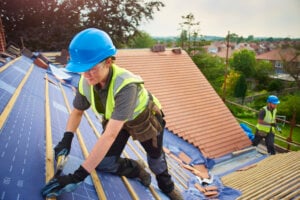Even in a brand new home, there are still routine maintenance procedures you should conduct to prevent little issues from turning into big, expensive problems. Every year, snow storms and freezing weather result in over a billion dollars in homeowner insurance claims. They’re usually the result of water that seeps in through vulnerable spots. Here are a few tips to help you get ready for Old Man Winter. Have you got a winterizing tip? Share it!
Before the first storm, schedule an appointment to have your heating system professionally inspected. Clean or replace all the filters.
If you have a fireplace, have it professionally inspected and, if necessary, cleaned before you light your first fire. Birds and critters often build nests in chimneys during warm weather, creating a fire hazard. So can soot build up.
Hire a professional to check your roof and repair or replace damaged flashing and worn shingles or tiles.
Clear your gutters and downspouts. If you don’t have them already, install leaf guards on the gutters to prevent debris from building up in the future. Also, put extensions on your downspouts to direct running water away from your foundation.
If any ductwork is exposed, insulate to keep air warm as it circulates in your attic and crawl spaces.
Doors and windows are typically the weakest link in your quest to prevent cold air and water damage. Check all your door seals and replace those that are worn or damaged. Check the caulking on your windows and remove and replace any caulk that is crumbling.
If you have a basement, install plastic shields on the window wells to keep water from leaking in.
If there is any chance of freezing where you live, there are some extra precautions you can take. Insulate all your exposed and exterior pipes to keep them from bursting. Drain your air conditioner pipes. If your AC unit has a water shut-off valve, turn it to off. If you’ll be away from home for more than a few hours, set your thermostat around 55 to avoid frozen plumbing, burst pipes and flooding. Open up your water heater cabinet to let warm air circulate.
Change the batteries on your smoke, carbon monoxide and radon detectors. Now that your house will be closed up tight, you want to be certain those alarm systems are in good working order.
Good work. Now, when the weather outside turns frightful, you’ll be snug and safe inside.









